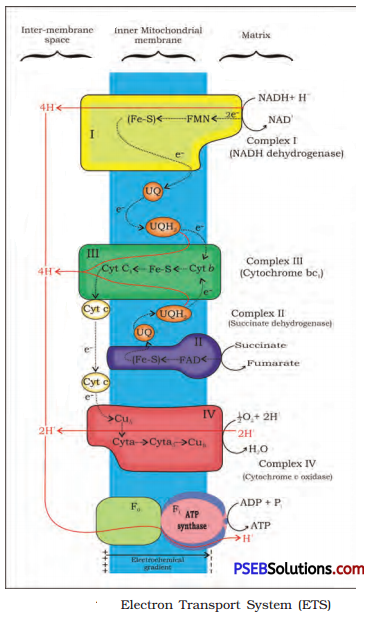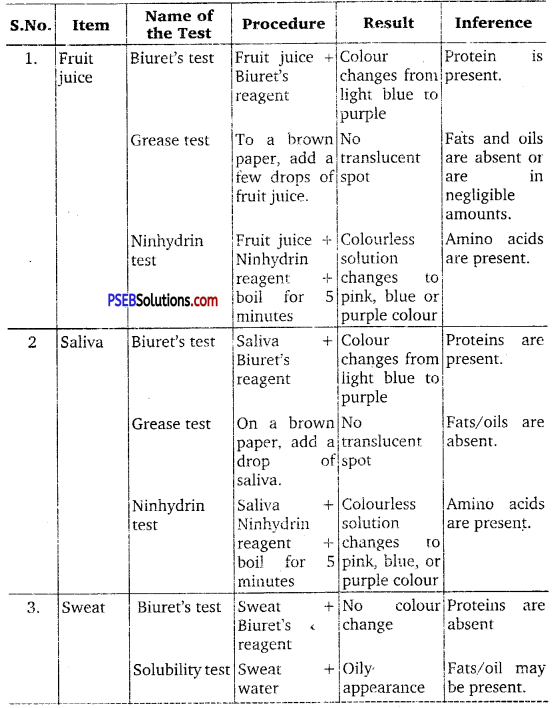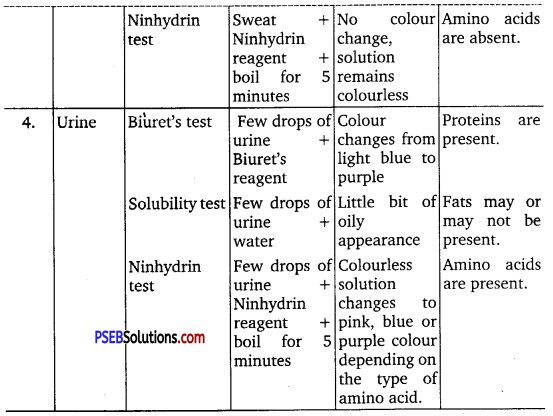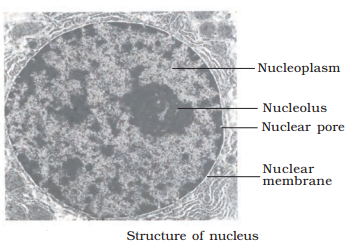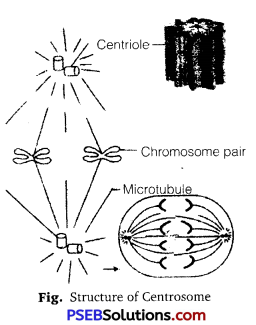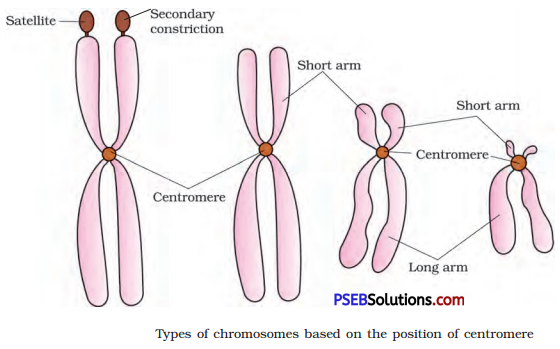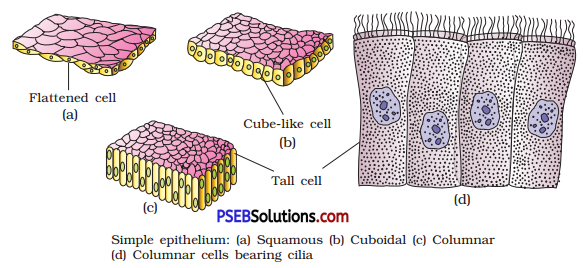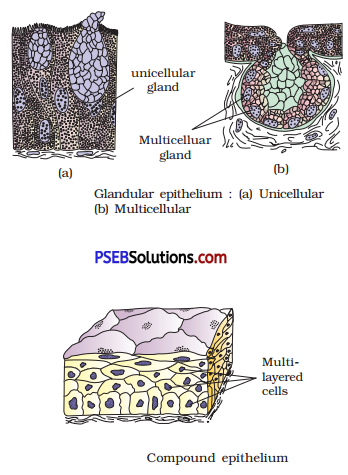Punjab State Board PSEB 11th Class Biology Book Solutions Chapter 10 Cell Cycle and Cell Division Textbook Exercise Questions and Answers.
PSEB Solutions for Class 11 Biology Chapter 10 Cell Cycle and Cell Division
PSEB 11th Class Biology Guide Cell Cycle and Cell Division Textbook Questions and Answers
Question 1.
What is the average cell cycle span for a mammalian cell ?
Answer:
The average cell cycle span for a mammalian cell is 24 hours.
Question 2.
Distinguish cytokinesis from karyokinesis?
Answer:
Cytokinesis is the division of cytoplasm, whereas karyokinesis is the division of nucleus of the cell.
![]()
Question 3.
Describe the events taking place during interphase.
Answer:
The interphase, though called the resting phase, is the time during which the cell is preparing for division by undergoing cell growth and DNA replication. The interphase is divided into three further phases
(i) G1 – phase (Gap 1)
(ii) S – phase (Synthesis)
(iii) G2 – phase (Gap 2)
G1 – phase corresponds to the interval between mitosis and initiation of DNA replication. During Ga-phase the cell is metabolically active and continuously grows but does not replicate its DNA. S or synthesis phase marks the period during, which, DNA synthesis or replication takes place. During this time, the amount of DNA per cell doubles.
During the G2 – phase, proteins are synthesised in preparation for mitosis, while cell growth continues.
Cells in this stage remain metabolically active but no longer proliferate unless called on to do so depending on the requirement of the organism.
Question 4.
What is G0 (quiescent phase) of cell cycle?
Answer:
G0 is the quiescent stage of the cell cycle. It is also known as inactive stage of the cell cycle. Cells in this stage remain metabolically remain active, but no longer proliferate unless called on to do so depending on the requirement of the organisms.
Question 5.
Why is mitosis called equational division?
Answer:
Mitosis is the kind of cell division in which daughter cells have the same number and kind of chromosomes as that of parent cell. Mitosis is therefore, also known as equational division.
Question 6.
Name the stage of cell cycle at which one of the following events occur:
(i) Chromosomes are moved to spindle equator.
(ii) Centromere splits and chromatids separate.
(iii) Pairing between homologous chromosomes takes place.
(iv) Crossing over between homologous chromosomes takes place.
Answer:
(i) Prophase,
(ii) Anaphase,
(iii) Zygotene stage of meiosis-I,
(iv) Pachytene stage.
![]()
Question 7.
Describe the following:
(i) Synapsis
(ii) Bivalent
(iii) Chiasmata
Draw a diagram to illustrate your answer.
Answer:
(i) Synapsis: During meiosis-I, the process of pairing of two homologous chromosomes is known as synapsis. It is so exact that pairing is not merely* between corresponding chromosomes but between corresponding individual units.
(ii) Bivalent: The complex formed by a pair of synapsed homologous chromosomes is called a bivalent or a tetrad. It consists of four chromatids.
(iii) Chiasmata: The chiasmata formation is the indication of completion of crossing over and beginning of separation of chromosomes. The chiasma is formed when the chromosomal parts begin to repel each other except in the region where these are in contact. Thus, chiasmata formation is necessary for the separation of homologous chromosomes.
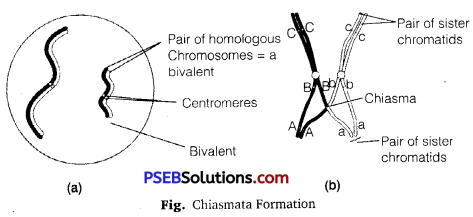
Question 8.
How does cytokinesis in plant cells differ from that in animal cells?
Answer:
Cytokinesis in an Animal Cell: It occurs by a process called cleavage. A cleavage furrow appears and at the site of the cleavage furrow the cytoplasm has a ring of microfilaments made of actin associated with molecules of the protein myosin. This ring of proteins will contract causing the furrow to deepen, which will then in turn pinch the cell into two separate cells.
Cytokinesis in a Plant Cell: In a plant cell, vesicles containing cell wall material collect at the middle of the parent cell. They will fuse and form a membranous cell plate. This plate will grow outward and it accumulates more cell wall material. Eventually, the plate will fuse with the plasma membrane and the cell plate contents will join the parental cell wall. This results in two different daughter cells.
Question 9.
Find examples where the four daughter cells from meiosis are equal in size and where they are found unequal in size.
Answer:
The four daughter haploid cells may or may not be equal in size at the end of meiosis-II with telophase-II
![]()
Question 10.
Distinguish anaphase of mitosis from anaphase-1 of meiosis. Ans. Differences between anaphase of mitosis and anaphase-I of meiosis.
Answer:
| Anaphase of Mitosis | Anaphase-I of Meiosis |
| 1. Each chromosome arranged at the metaphase plate is split simultaneously and the two daughter chromatids, begin to migrate towards the two opposite poles. | The spindle fibres contract and pull the centromeres of homologous chromosomes towards the opposite poles. |
| 2. The centromere of each chromosome is towards the pole with arms of chromosome trailing behind. | The centromere is not divided, so half of the chromosomes of parent nucleus go to one pole and the remaining half in the opposite pole. |
| 3. In this stage
(a) centromeres split and chromatids separate. (b) chromatids move to opposite poles. |
In this stage
(a) homologous chromosomes separate. (b) sister chromatids remain associated at their centromere. |
Question 11.
List the main differences between mitosis and meiosis.
Answer:
| Mitosis | Meiosis |
| 1. The division occurs in somatic cells. | It occurs in reproductive cells. |
| 2. It is a single division. | It is a double division. |
| 3. The daughter cells resemble each other as well as their mother cell. | The daughter cells neither resemble one another nor their mother cell. |
| 4. Replication of chromosomes occurs before every mitotic division. | Replication of chromosomes occurs only once though meiosis is a double division. |
| 5. Mitosis does not introduce variations. | Meiosis introduces variations. |
| 6. Mitosis is required for growth, repair and healing. | Meiosis is involved in sexual reproduction. |
Question 12.
What is the significance of meiosis?
Answer:
Meiosis is the mechanism by which conservation of specific chromosome number of each species is achieved across generations in sexually reproducing organisms.
It also increases the genetic variability in the population of organisms from one generation to the next. Variations are very important for the process of evolution.
![]()
Question 13.
Discuss with your teacher about:
(i) haploid insects and lower plants where cell-division occurs, and
(ii) some haploid cells in higher plants where cell-division does
not occur.
Answer:
(i) In some insects and lower plants fertilization is immediately followed by zygotic meiosis, which leads to the production of haploid organisms. This type of life cycle is known as haplontic life cycle.
(ii) The phenomenon of polyploidy can be observed in some haploid cells in higher plants in which cell division does not occur. Polyploidy is a state in which cells contain multiple pairs of chromosomes than the basic set. Polyploidy can be artificially induced in plants by applying colichine to cell culture.
Question 14.
Can there be mitosis without DNA replication in S-phase?
Answer:
No, DNA replication is required for doubling the chromosome number.
Question 15.
Can there be DNA replication without cell division?
Answer:
Yes, DNA replication takes place during the synthesis stage of interphase in the cell cycle. It is totally independent of cell division. After G2 -phase a cell may or may not enter into the M-phase.
![]()
Question 16.
Analyse the events during every stage of cell cycle and notice how the following two parameters change?
(i) Number of chromosomes (n) per cell
(ii) Amount of DNA content (C) per cell.
Answer:
(i) The number of chromosomes (n) is double in the prophase, metaphase and anaphase stage of an organism. In the telophase stage, during daughter cell formation, the number of chromosomes get reduced to half.
(ii) Amount of DNA content (C) per cell also changes during different phases of cell division. It is double in the prophase, metaphase and anaphase stage of an organism. In the telophase stage, during daughter cell formation, the number of chromosomes get reduced to half than that of their parents. ’


